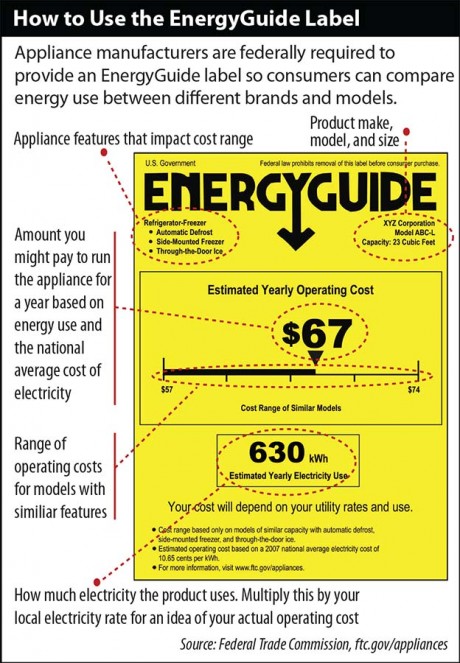Smart buys
How to choose efficient appliances
By TJ KirkIt’s never a good day when you realize you need to replace a large appliance in your home. However, when that unfortunate time comes, take a moment and consider what you will purchase — especially for appliances that haven’t been replaced in a number of years, as the technology may have changed substantially.
Instead of rushing out to buy the same make and model of appliance you had, consider this an opportunity to assess the market and make a smart purchase that will save you money in the long run.
According to the Department of Energy, appliances account for about 13 percent of the average household’s energy use. Clothes dryers, refrigerators/freezers, computers, microwaves, dishwashers and washing machines are the appliances that tend to use the most energy in a typical American home.
Operating costs
Every appliance you buy has an operating cost, which is the cost of the energy needed to power the appliance. To facilitate more informed comparison shopping, the federal government requires some appliances to have an Energy Guide label stating the approximate energy consumption and operating cost of the appliance. Appliances with an Energy Star label use 10 to 50 percent less energy than standard appliances and are generally more expensive than their standard counterparts. So, it’s important to compare the lifetime costs of each (upfront cost + operating cost) to ensure that purchasing the efficient appliance is the best choice.
What size do you need?
In addition, make sure to consider size. Purchasing an appliance that is too large for your needs will lead to more energy being used. For example, laptops or small desktops (e.g., the Mac Mini) use only one-quarter of the energy of typical desktop PCs and have sufficient memory and processing speeds for many common applications. This same principle applies to refrigerators, air conditioners and more.As you begin your search for a new appliance, check with your electric cooperative to see if it offers incentives for energy efficient appliances. You can also use the Energy Star website, energystar.gov, as an additional resource.
Dramatic advancements in the efficiency of many electric appliances now can provide the same level of end-user comfort with substantially less electric input. With a little research and forethought, you can save money over the life of your appliance without sacrificing any benefits. Happy shopping!
About the Author
Thomas Kirk is a technical research analyst specializing in energy efficiency and renewable energy for the Cooperative Research Network (CRN), a service of the Arlington, Va.-based National Rural Electric Cooperative Association.-
Share this story:



